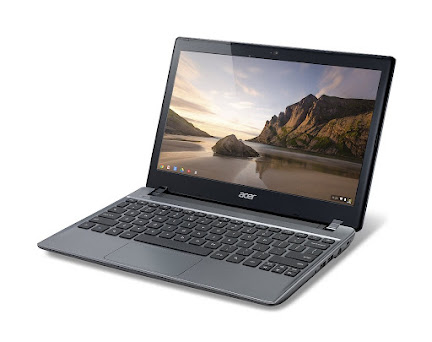In the ever-evolving landscape of computing devices, Chromebooks have emerged as a unique and affordable alternative to traditional laptops. These lightweight machines, powered by Google's Chrome OS, offer a streamlined and user-friendly experience. In this comprehensive buyer's guide, we will delve into the world of Chromebooks, understanding what they are, what they can do, and where their limitations lie.
What is a Chromebook?
A Chromebook is a type of laptop that runs on Chrome OS, an operating system developed by Google. Unlike traditional laptops that rely heavily on locally installed software, Chromebooks center around cloud-based applications and services. This design philosophy not only enhances the device's speed and security but also allows for seamless integration with Google's suite of productivity tools.
What Can a Chromebook Do?
Web Browsing: Chromebooks excel at web browsing. The Chrome browser is at the core of the Chrome OS experience, providing a fast and efficient platform for accessing websites, online applications, and cloud-based services.
Productivity: Chromebooks offer a suite of Google productivity apps, including Google Docs, Sheets, and Slides, which allow users to create and edit documents, spreadsheets, and presentations collaboratively in real-time.
Email and Communication: Chromebooks seamlessly integrate with Gmail, offering a reliable platform for email communication. Additionally, they support various messaging apps, making it easy to stay connected.
Multimedia: While Chromebooks have limited onboard storage, they are designed to leverage cloud-based storage solutions. Streaming music, videos, and movies is effortless, and the integration with Google Photos simplifies photo and video management.
Android Apps: Many modern Chromebooks support Android apps from the Google Play Store. This expands the device's capabilities by providing access to a wide range of mobile apps, including games, social media, and productivity tools.
Security: Chromebooks are known for their robust security features. The Chrome OS is designed with multiple layers of protection, including automatic updates, sandboxing, and verified boot, which significantly reduces the risk of malware and viruses.
Offline Use: While Chromebooks rely heavily on an internet connection, they also offer certain offline capabilities. Users can work on Google Docs and other apps offline, and the changes will sync when an internet connection is restored.
What Can't a Chromebook Do?
Advanced Software: Chromebooks lack the ability to run traditional desktop software like Photoshop, AutoCAD, or professional video editing tools. This limitation can be a drawback for users who require specialized software for their work.
Gaming: While the addition of Android apps has expanded gaming possibilities, Chromebooks are not ideal for high-end gaming. They might run simpler mobile games smoothly, but resource-intensive PC games are generally not supported.
Complex Video Editing: While basic video editing can be done using cloud-based applications, professional-grade video editing software is not available on Chromebooks due to hardware and software limitations.
Limited Offline Functionality: Although certain apps work offline, the majority of Chromebook functionality relies on an internet connection. Without Wi-Fi or mobile data, the device's capabilities are significantly reduced.
Peripheral Compatibility: Chromebooks might not be compatible with all external devices like printers, scanners, or specialized hardware due to the Chrome OS's limited driver support.
Storage Constraints: Most Chromebooks come with limited onboard storage, encouraging users to rely on cloud storage solutions. This could be a concern for those who require substantial local storage for files and applications.
Considerations Before Buying a Chromebook
Intended Use: Determine how you plan to use the Chromebook. If your needs primarily involve web browsing, word processing, and online communication, a Chromebook could be a great fit. However, if you require resource-intensive tasks or specialized software, a traditional laptop might be a better choice.
Android App Support: Check if the Chromebook model you're considering supports Android apps. This can significantly enhance the device's functionality by providing access to a wider range of applications.
Offline Requirements: Evaluate how often you'll need to use the Chromebook without an internet connection. If offline functionality is crucial, consider models that offer better offline capabilities.
Screen Size and Resolution: Chromebooks come in various screen sizes and resolutions. Choose a size and resolution that align with your preferences and usage patterns.
Build Quality: Consider the build quality, materials, and durability of the Chromebook. Some models offer premium build features while others are more budget-friendly.
Battery Life: Battery life can vary among Chromebook models. Look for a device that offers long-lasting battery performance to suit your usage needs.
Storage: Decide whether you can work with limited onboard storage or if you need a model that supports expandable storage through SD cards or external drives.
Conclusion
Chromebooks offer a unique blend of affordability, speed, security, and cloud-based convenience. With their emphasis on web-based applications and services, they cater to users who primarily require internet-centric tasks like web browsing, email, and basic productivity. However, their limitations in running resource-intensive software and offline functionality might not suit all users' needs.
Before purchasing a Chromebook, carefully assess your usage patterns and requirements. If your needs align with its capabilities, a Chromebook can provide a cost-effective and efficient computing experience. As technology continues to evolve, Chromebooks are likely to further bridge the gap between web-based and traditional computing, making them an attractive option for a wide range of users.

